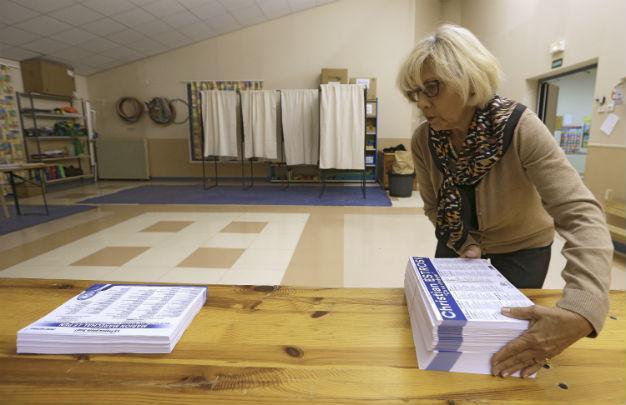Suspense as French far right eyes first regional prize
PARIS - Agence France-Presse

A worker at a polling station prepares the ballots before the opening, in the regional elections, Sunday, Dec. 13, 2015, in Nice, southeastern France. AP photo
France voted on Dec. 13 with the far-right National Front (FN) hoping to win control of a region for the first time, giving leader Marine Le Pen a launchpad for her presidential bid in 2017.Voting opened amid heightened security, especially in Paris, as France remains under a state of emergency declared after the Nov. 13 attacks that claimed 130 lives.
The anti-immigration FN topped the vote in six of 13 regions in the first round of voting last Sunday, capitalising on security fears in the wake of the Paris attacks.
But the FN faces an uphill battle to consolidate those gains after the ruling Socialist Party withdrew its candidates from two key regions and urged their supporters there to back former president Nicolas Sarkozy's conservative Republicans.
"The political world has been thrown off course completely," said a 34-year-old voter who gave his name only as Sylvain. "Asking us to vote to prevent the FN from winning, without the elites asking themselves any questions at all, shows that there is something seriously wrong."
The race is expected to be close in several regions. Pollster Jean-Daniel Levy of Harris Interactive said the FN was "almost certain" to win one region, while Bruno Jeanbart of OpinionWay said it would win between "zero and five".
A TNS-Sofres poll on Wednesday showed Le Pen, who heads the party list in the economically depressed northeastern Nord-Pas-de-Calais-Picardie region, would lose easily to the Republicans' Xavier Bertrand.
In the southern Provence-Alpes-Cote d'Azur region, her 26-year-old niece Marion Marechal-Le Pen was shown far behind the Republicans' Christian Estrosi.
Other polls gave similar results in the regional elections, the last contest before the 2017 presidential vote.
Both women had easily outpaced their conservative rivals in the first round, each grabbing more than 40 percent of the vote, but the party's hopes of winning its first-ever region could be crushed by its opponents' political manoeuvring.
The Socialists have pulled out their candidates in the regions where Le Pen and her niece are running and called on voters to back the opposition, a risky tactic as it plays into the far-right's claim that the two main parties are indistinguishable.
Hammering home her message that the FN offers a viable alternative to both right and left, Le Pen vowed if elected to "make the government's life a misery... every day, every week."
Nationwide, the FN took 28 percent of the vote last Sunday, ahead of 27 percent for the Republicans and their allies.
President Francois Hollande's Socialists suffered their fourth electoral beating since coming to power in 2012 as voters punished their failure to cut stubbornly high jobless figures, but held up better than expected with 23.5 percent.
Le Pen has reaped the rewards of her efforts to "de-demonise" the party bequeathed by her father Jean-Marie Le Pen, but it retains a stridently anti-immigrant and often Islamophobic message that she has amplified since last month's carnage in Paris.
Her campaign has also exploited anger over the situation in the northern port of Calais, where thousands of migrants are camping in squalid conditions in the hope of reaching Britain.
Socialist Prime Minister Manuel Valls has called the FN a "fraud" that wants to return France to the "wars of religion" and said he had "no hesitation" in urging voters to back the Republicans to keep the FN from power -- as they did in 2002 when voters switched to Jacques Chirac in a presidential run-off against Jean-Marie Le Pen.
Sarkozy, who has been accused of flirting with the FN's ideas on immigration and Islam, has taken a different approach.
He said a vote for the FN was "not immoral" but they were "people who have never run anything, have no plan, have no self-control, who would create chaos".
Some 45.3 million people are eligible to cast their ballots, with the last polling stations closing in large cities at 8:00 pm (1900 GMT).
















